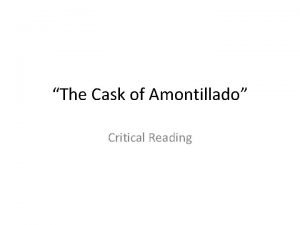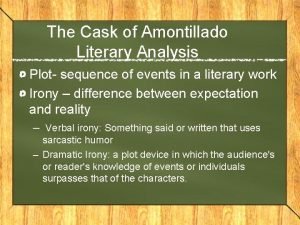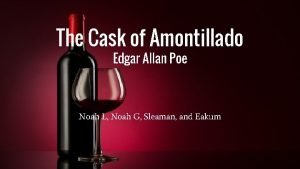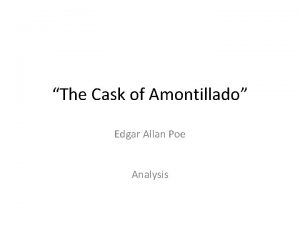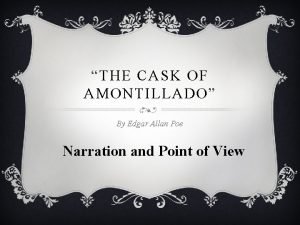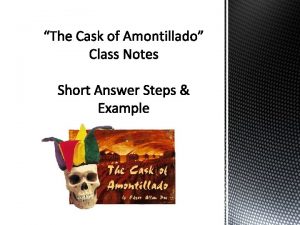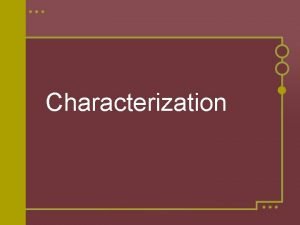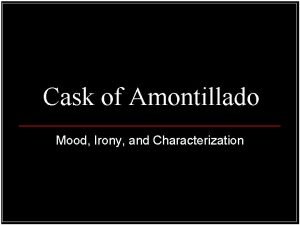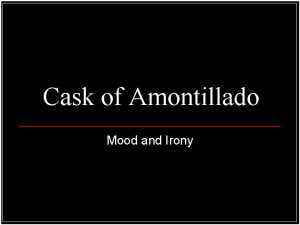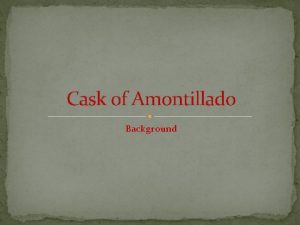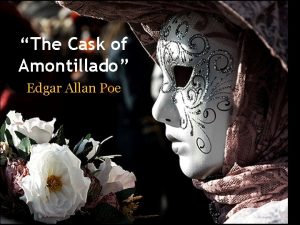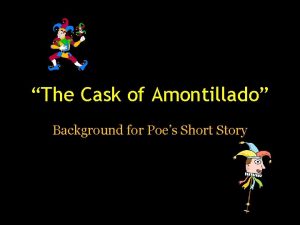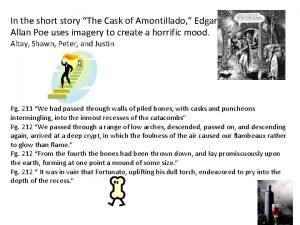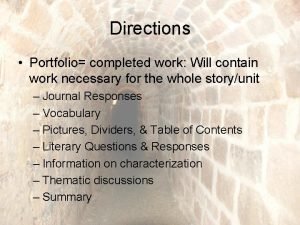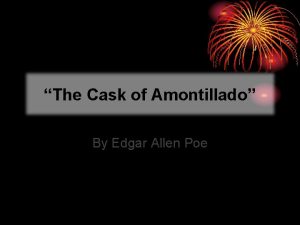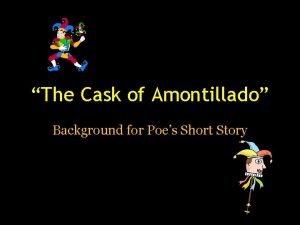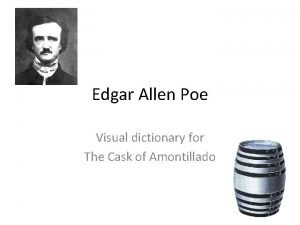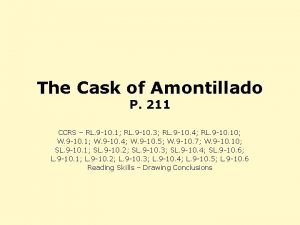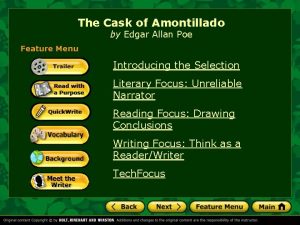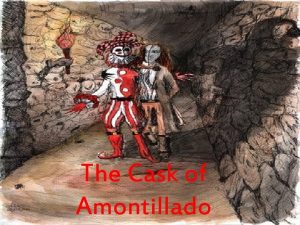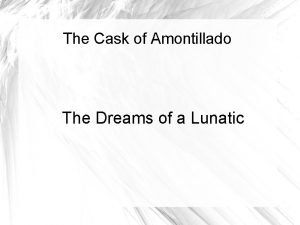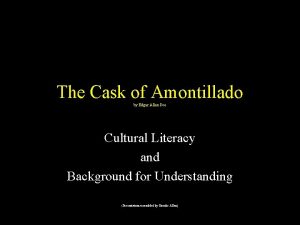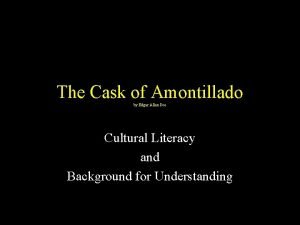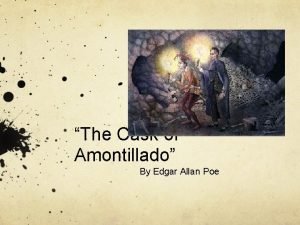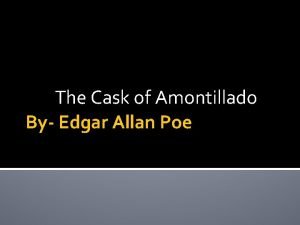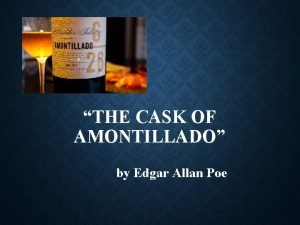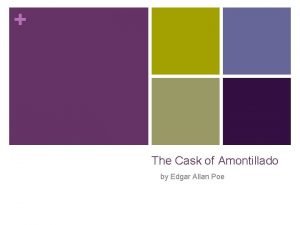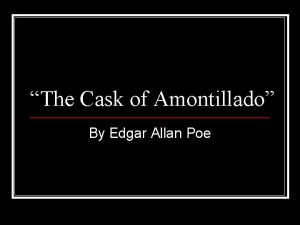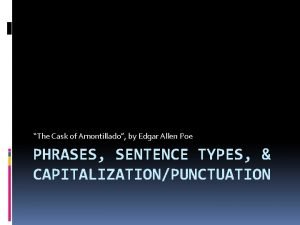The Cask of Amontillado Critical Reading Question 1




![Answer • [A wrong is. . . done the wrong. ] Answers may vary, Answer • [A wrong is. . . done the wrong. ] Answers may vary,](https://slidetodoc.com/presentation_image_h/15652b24bdccbb155ed31c71a38ce751/image-5.jpg)











![Answer • “Enough, ” [Fortunato] said. “The cough’s a mere nothing; it will not Answer • “Enough, ” [Fortunato] said. “The cough’s a mere nothing; it will not](https://slidetodoc.com/presentation_image_h/15652b24bdccbb155ed31c71a38ce751/image-17.jpg)












- Slides: 29

“The Cask of Amontillado” Critical Reading

Question 1. Hyperbole is the use of exaggeration to make a point. Look at the first paragraph. What phrase used by the narrator is an example of hyperbole? Write down the full sentence that includes the hyperbolic element. Does this line make you more sympathetic or less toward the narrator/murderer? Why?

Answer • The hyperbolic line is: “The thousand injuries of Fortunato I had borne as I best could, but when he ventured upon insult I vowed revenge. ” • Obviously, Fortunato hasn’t harmed Montresor a full 1, 000 times. • Answers to the second part will vary, but the line makes me less sympathetic because I can’t imagine Fortunato has done anything so terrible as to warrant this brutal killing. • Montresor is exaggerating (and not actually explaining) Fortunato’s offenses

Question 2. Montresor tells us, “A wrong is unredressed when retribution overtakes its redresser. It is equally unredressed when the avenger fails to make himself felt as such to him who has done the wrong. ” In your own words, explain what this means.
![Answer A wrong is done the wrong Answers may vary Answer • [A wrong is. . . done the wrong. ] Answers may vary,](https://slidetodoc.com/presentation_image_h/15652b24bdccbb155ed31c71a38ce751/image-5.jpg)
Answer • [A wrong is. . . done the wrong. ] Answers may vary, but these sentences might be rephrased this way: “A wrong is not avenged if the avenger either is punished for taking revenge or does not make the wrongdoer aware that he is taking revenge. ”

Question 3. What is it about Montresor that makes him an especially effective enemy to Fortunato? Give an example from a book you’ve read or a film/T. V. show you’ve seen in which this type of villain exists.

Answer • Montresor is effective because Fortunato doesn’t know that he’s an enemy. An enemy disguised as a friend is far more dangerous than an openly pronounced foe because the “frenemy” has access to you and information about your life that an adversary would not easily know. • This two-faced villain reminds me of Iago from Shakespeare’s play Othello. Iago, one of Othello’s trusted military leaders, secretly hates Othello and easily lies to his face, setting traps and manipulations that lead the military general to kill his beloved wife and end his own life. It’s fascinating–and scary–to watch.

Question 4. Fortunato, who has been out drinking and enjoying Carnival, is wearing a clown’s hat. Symbolically, why is this an interesting–and appropriate–costume choice by the writer, Edgar Allan Poe?

Answer • Fortunato is dressed like a court jester or clown and he is, in fact, a fool who falls into Montresor’s trap. • The clothing makes the man in this story. Fortunato is fooled by Montresor, but it is also partly Fortunato’s own foolish ego that leads him into peril, as he feels competitive with Luchresi and wants to present himself as the better man. • Finally, the costume emphasizes the irony of Fortunato’s name, which could loosely translate to “fortunate” in English. He, of course, is just the opposite of fortunate, as he will die in the catacombs.

Question 5. To whom, do you suppose, is Montresor telling this story? Upon what evidence do you base your assumption?

Answer • It is not clear to whom Montresor speaks, but it would have to be a trusted friend or, perhaps, even God himself. • The narration takes place 50 years after the murder, so it’s also likely that this is a death-bed confession to a religious minister. The second sentence hints at this with the “You, who so well know the nature of my soul, ” line. • Students’ answers will vary, but they should be logical.

Question 6. Name three of the many clever things Montresor does to lure Fortunato into his trap.

Answer • There are several answers that work here: • First, he dangles a rare treat, the Amontillado, before Fortunato, who is a known wine connoisseur. • Second, he finds Fortunato on a party night when he’s already a bit drunk and his defenses are down. • Third, he continues to ply Fortunato with alcohol to further blur his judgment. • Fourth, he uses the threat of Fortunato losing his opportunity to sample the Amontillado to a rival, Luchresi. • Fifth, he pretends several times that it would be best for them not to proceed further down the path, knowing that Fortunato will insist they continue.

Question 7. How did Montresor ensure that no servants would be around to witness the crime?

Answer • He told them he would be gone all night and ordered them to stay in the house instead of going to the city-wide party. Of course, the moment he left out the front door, they all left out the back door. • When the cat’s away, the mice will play, as the old saying goes.

Question 8. Poe uses several elements of foreshadowing. Write down (or paraphrase) two lines that foreshadow the grisly event at the end of the tale.
![Answer Enough Fortunato said The coughs a mere nothing it will not Answer • “Enough, ” [Fortunato] said. “The cough’s a mere nothing; it will not](https://slidetodoc.com/presentation_image_h/15652b24bdccbb155ed31c71a38ce751/image-17.jpg)
Answer • “Enough, ” [Fortunato] said. “The cough’s a mere nothing; it will not kill me. I shall not die of a cough. ” • Montresor has brought a trowel with him to the catacombs, which he jokingly shows to Fortunato, who is too thick to ask questions.

Question 9. Locate and write down a line that includes verbal irony.

Answer • When the two men are drinking the Medoc, Fortunato says, “I drink. . . to the buried that repose around us. ” Then, Montresor says, “And I to your long life. ” This is ironic because Montresor intends for just the opposite to be true.

Question 10. When Montresor offers the Medoc wine to Fortunato, what is the reason he gives for wanting the other man to drink? What is the real reason? Why does Montresor also have a drink?

Answer • He says that Fortunato should drink because it will help warm him, countering the damp coldness of the underground tunnels. • He really, though, just wants to keep Fortunato drunk. • He drinks some himself probably to stay warm, but also probably to steel his nerves against the crime he’s about to commit.

Question 11. At the end of the story, what makes Montresor feel sick?

Answer • It’s most likely a combination of the dampness of the tunnels and the niter, or potassium nitrate, in the air. • He does not feel sick about what he’s done to Fortunato. There’s no guilt or remorse here. He’s reacting physically to the damp, ill environment.

Question 12. Is Montresor a reliable or unreliable narrator? Explain your answer.

Answer • Montresor is the classic unreliable narrator. We should not fully believe everything he says, as he is clearly mentally deranged. • He’s a murderer who never gives us a full or satisfying reason for the murder. • He’s acting on emotion, but we are not able to tell if his actions are justified and we should sense that they probably aren’t. • Also, he’s telling this story 50 years later, meaning that details and accuracies have certainly faded with time.

Question 13. Poe is a master at creating an eerie, suspenseful mood in his stories. Dig back into the text of this story and write down two lines that help establish this mood. Yes, I want you to write down the full line.

Answer • Answers will vary, as there are many creepy descriptions of the setting, but I like: • The drops of moisture trickle among the bones. • We passed through a range of low arches, descended, passed on, and descending again, arrived at a deep crypt, in which the foulness of the air caused our flambeaux rather to glow than flame.

Question 14. Montresor acts as judge, jury, and executioner of Fortunato. Is there any crime/offense that Fortunato could have unwittingly committed that would make Montresor’s rage seem reasonable to you? Do you think individuals are ever justified in taking justice into their own hands? Explain your thoughts.

Answer • Answers will vary on this question. • The first question is tricky because Fortunato is clueless that Montresor holds a grudge against him. This makes the reader think that the offenses weren’t really as major as Montresor perceives them to be. • The second question often leads to a lively discussion, as students have passionate feelings about right/wrong and our criminal justice system.
 Montresor acts as judge jury and executioner of fortunato
Montresor acts as judge jury and executioner of fortunato Open ended questions for the cask of amontillado
Open ended questions for the cask of amontillado Critical semi critical and non critical instruments
Critical semi critical and non critical instruments Semi critical instruments in dentistry
Semi critical instruments in dentistry Edgar allan poe the cask of amontillado literary analysis
Edgar allan poe the cask of amontillado literary analysis The cask of amontillado by edgar allan poe summary
The cask of amontillado by edgar allan poe summary The cask of amontillado analysis
The cask of amontillado analysis The cask of amontillado point of view
The cask of amontillado point of view Background of the cask of amontillado
Background of the cask of amontillado The black cat summary and analysis
The black cat summary and analysis The cask of amontillado plot diagram
The cask of amontillado plot diagram The cask of amontillado man vs self
The cask of amontillado man vs self The cask of amontillado quiz
The cask of amontillado quiz Direct characterization in the cask of amontillado
Direct characterization in the cask of amontillado The cask of amontillado mood
The cask of amontillado mood The cask of amontillado mood
The cask of amontillado mood Cask of amontillado catacombs
Cask of amontillado catacombs The cask of amontillado verbal irony
The cask of amontillado verbal irony Alliteration in the cask of amontillado
Alliteration in the cask of amontillado Nitre definition cask of amontillado
Nitre definition cask of amontillado The cask of amontillado background
The cask of amontillado background Imagery in cask of amontillado
Imagery in cask of amontillado Symbolism in the cask of amontillado
Symbolism in the cask of amontillado The cask of amontillado tone
The cask of amontillado tone What preparations had montressor made for his revenge?
What preparations had montressor made for his revenge? The cask of amontillado background
The cask of amontillado background Palazzo definition cask of amontillado
Palazzo definition cask of amontillado What is the definition of allusion
What is the definition of allusion Cask of amontillado drawing
Cask of amontillado drawing Cask of amontillado pov
Cask of amontillado pov
